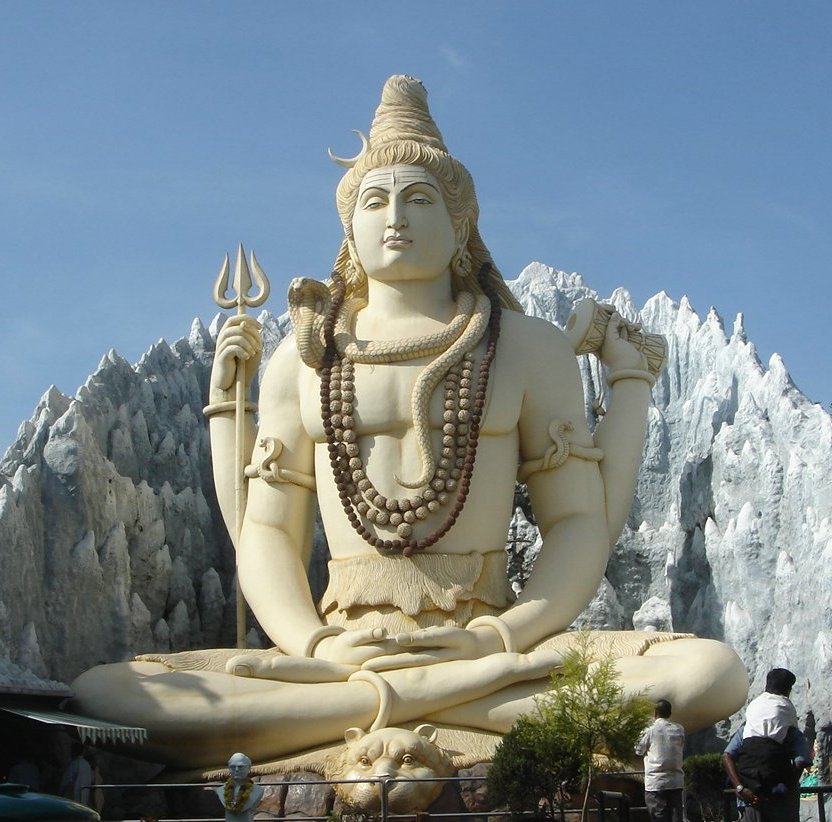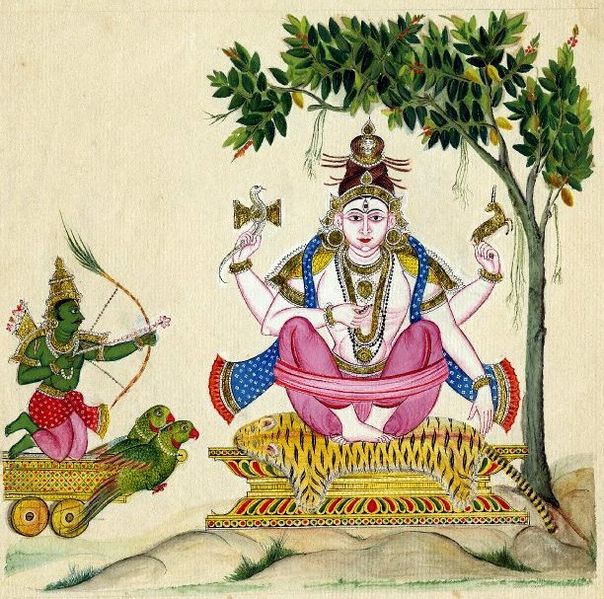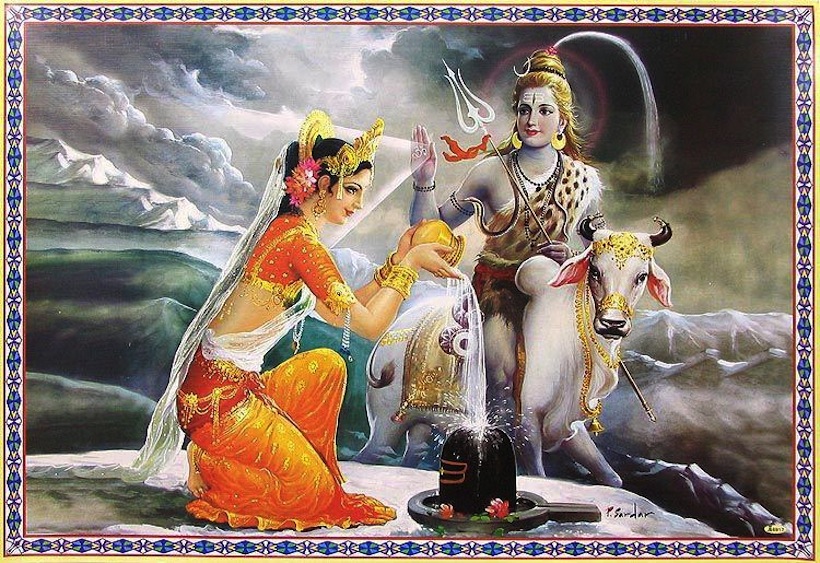Tonight is Maha Shivaratri, or the Great Night of Shiva. It is the celebration of the day of Lord Shiva and Parvati’s wedding, representing the unification of Shiva and Shakti, or the masculine and feminine forces of divine consciousness and energy. We celebrate each Shivaratri on the fourteenth night of the waning moon, while Maha Shivaratri falls on this night during the lunar month Magha.
This moon phase begins during the night on Monday, February 16th, 2015 in North America and continues through until the evening of the 17th (when the New Moon phase begins). In Hindu tradition, this night is highly auspicious for performing spiritual practices and penance in order to accrue grace and swifter spiritual gain. It is said that a boon (wish) from Lord Shiva may be granted to one who undergoes penance with devotion.
 Fasting and staying up all night are typical practices, along with yoga, chanting, meditation, and prayer. The panchakshara or five-syllabled mantra, “Om Namah Shivaya,” is particularly auspicious to chant on this day. It beckons forth divine love and the emergence of our higher self. In the Hindu trinity, Shiva is the destructive or transformative aspect of the divine, aiding in the destruction of our ego and the accompanying hindrances that do not serve us. This allows a rebirth into higher consciousness.
Fasting and staying up all night are typical practices, along with yoga, chanting, meditation, and prayer. The panchakshara or five-syllabled mantra, “Om Namah Shivaya,” is particularly auspicious to chant on this day. It beckons forth divine love and the emergence of our higher self. In the Hindu trinity, Shiva is the destructive or transformative aspect of the divine, aiding in the destruction of our ego and the accompanying hindrances that do not serve us. This allows a rebirth into higher consciousness.
Shiva is known as the greatest of yogis, who sits on a mountain top in meditation with equanimity for all creation, for aeons without disturbance. In the stories, he had retreated to Mount Kailash and renounced the world after the death of his first wife, Sati. The other gods eventually required Shiva to leave his meditation, however, in order to marry again and produce a son that could destroy a powerful demon who was terrorizing the three worlds.
 Parvati was born for this purpose (a reincarnation of Sati), and was naturally attracted to the meditative Shiva. She went to serve him while he was in his deep meditation, and grew to love him, even though her less devoted friends were turned off by his rough appearance. For a long time he seemed not to notice her, and thus Kamadeva, the God of Love, was sent to fire a love arrow at Shiva. Though this startled him and awakened him from his trance, he soon realized the scheme, destroyed Kamadeva and sent Parvati away. Her love for him did not diminish, however, and she prayed for a path that would lead him to accept her.
Parvati was born for this purpose (a reincarnation of Sati), and was naturally attracted to the meditative Shiva. She went to serve him while he was in his deep meditation, and grew to love him, even though her less devoted friends were turned off by his rough appearance. For a long time he seemed not to notice her, and thus Kamadeva, the God of Love, was sent to fire a love arrow at Shiva. Though this startled him and awakened him from his trance, he soon realized the scheme, destroyed Kamadeva and sent Parvati away. Her love for him did not diminish, however, and she prayed for a path that would lead him to accept her.
The sage Narada, who was in on the gods’ plan, told Parvati that Shiva could not be won by charm and beauty, but only by spiritual practice and austerity. Propelled by her love for Shiva, Parvati took up the life of an ascetic and left her father’s palace to live in the dirt on the forest floor, forgoing food, water, and luxuries while meditating on her lord. The force of love in her heart compelled a devotion that allowed her to burn away all fears and impurities through her meditation, and she became one of the most powerful yoginis.
Finally, having compassion for her and the three worlds (who were awaiting his heir to prevent their destruction), Shiva went to see Parvati in disguise in order to test her devotion. He asked her why she was performing such penance, and she replied that it was all for the deep love of her lord. He questioned why she would want to marry someone like Shiva who was crude and without riches, who carried skulls and associated with a wild crowd. She allowed the passion of her heart to rise and defended her lord, telling the man that Shiva was the greatest god and yogi and that only someone with a lower mind would not understand him.
 For the strength of her devotion, Shiva granted Parvati a boon and finally accepted her as his wife, and the worlds rejoiced. The complementary forces of Shiva and Shakti, masculine and feminine, divine father and mother, were finally able to unite and propel the dance of creation needed for all to be in balance. This is why on Maha Shivaratri, we celebrate and call upon the merging of these two halves, consciousness and energy, through penance and austerity. It is a great time to fast and refrain from indulging any of the five senses.
For the strength of her devotion, Shiva granted Parvati a boon and finally accepted her as his wife, and the worlds rejoiced. The complementary forces of Shiva and Shakti, masculine and feminine, divine father and mother, were finally able to unite and propel the dance of creation needed for all to be in balance. This is why on Maha Shivaratri, we celebrate and call upon the merging of these two halves, consciousness and energy, through penance and austerity. It is a great time to fast and refrain from indulging any of the five senses.
On this Shivaratri, Venus and Mars are tightly conjunct and joining Ketu in Pisces. Though Venus is exalted in Pisces and this could raise passion levels, it could also create confusion or a disturbance in relationships, and stir up overwhelming emotions including fear and feelings of isolation. Ketu’s influence brings a critical eye, and Venus and Mars are receiving an aspect from Pisces’ ruler, retrograde Jupiter, so this placement could cause us to temporarily retreat from Mars-Venus interactions. Moon and Mercury are also tightly conjunct, with a close aspect from Saturn and a wider aspect from retrograde Jupiter. This could bring an analytical influence to our emotional body and processing, but also a strong feeling of pressure (Saturn), and an evolving philosophy in regards to our emotions today.
Tomorrow, Tuesday, February 17th, begins the new moon phase (Amavasya), with the moment of new moon at 3:47pm Pacific time on Wednesday, the 18th. This new moon will occur with Sun and Moon in sidereal Aquarius in the nakshatra Dhanishta. Aquarius is a fixed air sign ruled by Saturn, so this cycle may bring some big ideas to the forefront that we hope to implement through action, perhaps continuing the Capricorn-cycle-driven urge to add structure to our lives. Aquarius is a place where the individual is less emphasized (opposite Leo, where the full moon will happen), so these ideas will apply more to our society and community, and acts of service are likely. Saturn brings the opportunity for discipline, so it could be a great time to add more to your spiritual practice, including some breath-work or pranayama.
Dhanishta, ruled by Mars, is the star of wealth. Its deities are the eight Vasus, which refer to the elements making up the earth and cosmos, and it is related to music and arts. We may be working on ideas to help increase wealth this moon cycle, especially creative endeavors that benefit the many. Though we may feel the disciplining and discerning force of Saturn, Mars and Venus will be joined in Pisces for a few weeks, which could cause some of our energy to get lost or diverted to the dream realm. Venus is exalted in Pisces, which can cause us to overemphasize our desires and fantasies, especially with the aspect from its retrograde ruler, Jupiter. With the critical influence of Ketu, be gentle with your relationships and partners. We may, however, get the chance to bring some of that dream-realm material into our artistic and community service endeavors with consciously-applied action and discipline.
Happy Maha Shivaratri, Hara Hara Mahadev!
#jyotish #astrology #Shivaratri #Sivaratri #horoscope #forecast #veda #vedicastrology #Ayurveda #newmoon #shiva #siva #parvati

